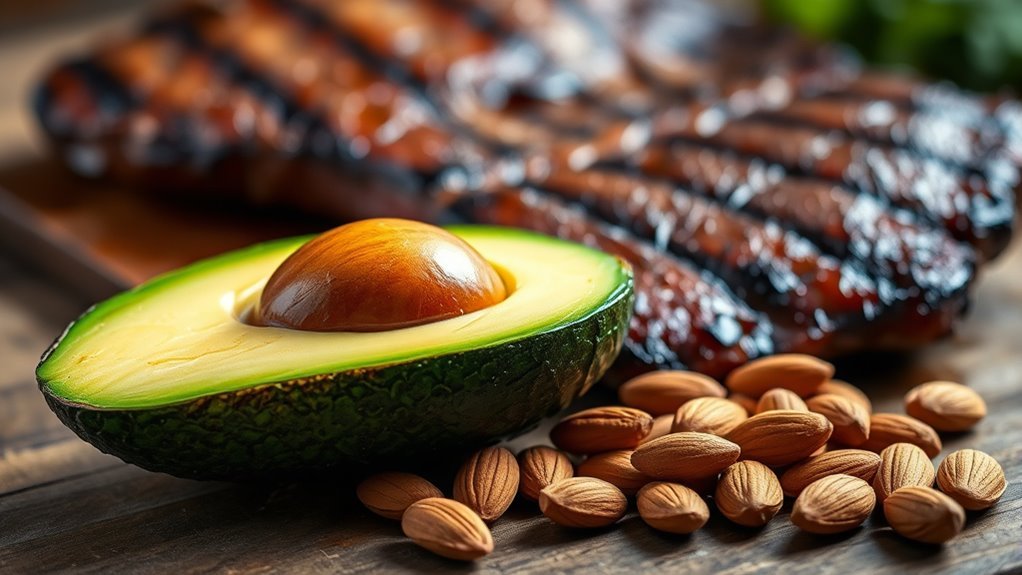Keto works by shifting your body’s energy source from carbs to fats, putting you in a state of ketosis. In this state, your liver converts fat into ketones, which become your primary fuel. This leads to lower insulin levels and stable blood sugar, enhancing your energy and reducing cravings. Plus, it helps suppress hunger hormones like ghrelin, making it easier to feel full. Stick around to discover more about the benefits and misconceptions around the keto diet.
Understanding Ketosis: The Core Mechanism

When you follow a ketogenic diet, your body enters a state called ketosis, which fundamentally alters how it produces energy. In this metabolic state, your liver converts fat into ketones, which become the primary energy source instead of carbohydrates. This ketosis process occurs when your carbohydrate intake is markedly reduced, forcing your body to adapt and burn fat more efficiently. As you limit sugars and starches, insulin levels drop, promoting fat breakdown. Understanding this shift is essential for anyone seeking the freedom to manage weight or improve metabolic health. While the change may come with challenges like the “keto flu,” the long-term benefits often outweigh the initial discomfort, empowering you to embrace a new way of fueling your body.
The Role of Fat as Fuel

As your body adapts to ketosis, fat becomes the primary fuel source, fundamentally changing your energy dynamics. In this state, fat metabolism ramps up, allowing your body to efficiently convert stored fats into energy. You’ll experience fat adaptation, where your body learns to prioritize dietary fats and fat storage for energy. This process promotes fat oxidation, turning fatty acids into ketone bodies, which serve as an alternative energy source for your brain and muscles. By enhancing fat utilization, you may find improved endurance and reduced hunger. Embracing this shift not only supports weight management but also grants you the freedom to enjoy a variety of dietary fats, ultimately redefining how you approach your nutrition and energy levels.
Impact on Insulin Levels

The keto diet greatly impacts insulin levels, primarily by reducing carbohydrate intake. This shift lowers blood sugar levels and enhances insulin sensitivity, making it easier for your body to manage glucose. By minimizing carbs, you’re effectively reducing the amount of insulin needed for blood sugar regulation.
Here’s a quick overview of the relationship between the keto diet, insulin, and blood sugar:
| Factor | Before Keto | After Keto |
|---|---|---|
| Carbohydrate Intake | High | Very Low |
| Blood Sugar Levels | High | Stabilized |
| Insulin Sensitivity | Low | Increased |
With improved insulin sensitivity, you may find greater energy levels and reduced cravings. This can lead to a more balanced approach to food and health.
Appetite Suppression and Hunger Hormones
While following a keto diet, many people experience appetite suppression, largely due to the way it influences hunger hormones. This can lead to improved appetite control, making it easier to manage your hunger cues. Here are some key factors contributing to this phenomenon:
- Increased ketone production reduces ghrelin, the hunger hormone.
- Stable blood sugar levels prevent spikes that trigger hunger.
- Higher fat intake promotes satiety, keeping you fuller longer.
- Protein-rich foods can enhance feelings of fullness.
- The ketogenic diet may alter brain signals related to appetite.
Increased Energy and Mental Clarity
Many individuals report increased energy levels and enhanced mental clarity when they adopt a keto diet, primarily due to the alteration in their body’s primary energy source. By shifting from carbohydrates to fats, your body begins to produce ketones, which provide a more efficient fuel source for both energy and brain function. This change can lead to an impressive energy boost, allowing you to engage more fully in daily activities. Additionally, many find that their mental focus sharpens, as ketones can enhance cognitive performance and reduce brain fog. The combination of sustained energy and improved mental clarity can empower you to pursue your goals with renewed vigor and determination, promoting a greater sense of freedom in your life.
Preserving Muscle Mass During Weight Loss
When you’re aiming to lose weight, preserving muscle mass is fundamental for maintaining overall health and metabolic function. To effectively support muscle preservation while losing fat, consider these strategies:
- Increase protein intake: Aim for 1.6 to 2.2 grams of protein per kilogram of body weight to promote muscle synthesis.
- Incorporate strength training: Engage in resistance exercises at least two to three times a week to stimulate muscle growth.
- Maintain a moderate calorie deficit: Avoid extreme calorie restrictions that can lead to muscle loss.
- Stay hydrated: Adequate water intake is essential for peak muscle function and recovery.
- Get enough sleep: Quality rest aids recovery and hormone regulation, both critical for preserving muscle.
Potential Health Benefits Beyond Weight Loss
Preserving muscle mass isn’t just about weight loss; it’s also linked to a range of health benefits that can enhance your overall well-being. The keto diet may promote improved markers of heart health, such as lower triglycerides and improved cholesterol levels. These changes can contribute to better cardiovascular outcomes. Additionally, embracing a ketogenic lifestyle can enhance your metabolic flexibility, allowing your body to efficiently switch between burning fat and carbohydrates for energy. This adaptability not only supports weight management but can also improve energy levels and mental clarity. By focusing on muscle preservation while following keto, you’re not just shedding pounds; you’re investing in your long-term health and wellness, fostering a lifestyle that promotes freedom and well-being.
Common Misconceptions About the Keto Diet
You might have heard that ketosis is dangerous or that carbs are essential for your health. However, research shows that when done correctly, ketosis can be safe and beneficial for many people. It’s also important to note that while carbohydrates play a role in your diet, they’re not the only source of energy your body can use.
Ketosis Is Dangerous
Though many people fear that ketosis is inherently dangerous, this common misconception often overlooks the nuanced reality of the ketogenic diet. While there are potential keto side effects, understanding these can lead to informed choices about long-term sustainability.
- Nutrient Deficiencies: If not planned carefully, you might miss out on essential vitamins.
- Keto Flu: Initial symptoms like fatigue or irritability can occur, but they’re often temporary.
- Heart Health: Some worry about increased cholesterol, but studies show varied results.
- Kidney Stress: Adequate hydration and electrolyte balance can mitigate this risk.
- Sustainability: Many find keto adaptable, maintaining it long-term with proper adjustments.
Carbs Are Essential
Many people believe that carbs are a fundamental part of a healthy diet, leading to the common misconception that cutting them out entirely is detrimental. While it’s true that carb sources provide energy, the keto diet emphasizes nutrient balance by prioritizing healthy fats and proteins. This doesn’t mean you should eliminate carbs completely; rather, it’s about choosing the right ones.
| Carb Sources | Nutrient Balance |
|---|---|
| Whole grains | Supports sustained energy |
| Fruits and vegetables | Provides essential vitamins |
| Legumes | Offers fiber and protein |
| Nuts and seeds | Delivers healthy fats |
Understanding how to balance these elements can empower you to navigate your diet effectively, promoting freedom in your food choices.
1. What is the ketogenic diet and how does it work?
The ketogenic diet, commonly known as the keto diet, is a low-carbohydrate, high-fat eating plan that aims to switch the body’s primary energy source from glucose to ketones. When carbohydrate intake is significantly reduced, the body enters a metabolic state called ketosis. In this state, the liver converts fatty acids into ketones, which can be used as an alternative fuel source, leading to fat loss and improved energy levels.
2. Why does the ketogenic diet lead to weight loss?
The ketogenic diet promotes weight loss primarily by reducing insulin levels and increasing fat oxidation. When carbohydrate intake is minimized, the body produces less insulin, a hormone that facilitates fat storage. Lower insulin levels encourage the body to burn fat for fuel. Additionally, the high-fat content of the diet can lead to increased satiety, making individuals feel fuller for longer and consequently reducing overall caloric intake.
3. Are there any health benefits associated with the ketogenic diet?
Yes, the ketogenic diet has been associated with several health benefits beyond weight loss. Research indicates that it may improve blood sugar control, making it beneficial for individuals with type 2 diabetes. Additionally, some studies suggest that the diet can enhance cognitive function and may provide neuroprotective effects in conditions like epilepsy and Alzheimer’s disease. However, it’s essential to consult with a healthcare provider before starting any new diet, especially if you have underlying health issues.
4. Is the ketogenic diet safe for everyone?
While the ketogenic diet can be safe and effective for many individuals, it is not suitable for everyone. People with certain medical conditions, such as pancreatitis, liver disease, or those with a history of eating disorders, should avoid the keto diet. Additionally, pregnant or breastfeeding women should consult a healthcare professional before making significant dietary changes. It’s vital to tailor any diet to individual health needs and goals.
5. How can I start a ketogenic diet effectively?
To start a ketogenic diet effectively, begin by calculating your macronutrient needs, focusing on high-fat, moderate-protein, and very low-carbohydrate foods. Incorporate healthy fats such as avocados, nuts, and olive oil, along with moderate protein sources like meat and fish. Eliminate high-carb foods like bread, pasta, and sugary snacks. Gradually transition into ketosis by reducing carb intake over a few days. Staying hydrated and considering electrolyte supplementation can help minimize the “keto flu,” a common initial side effect. It’s advisable to consult a nutritionist or dietitian for personalized guidance.
References
- https://www.ncbi.nlm.nih.gov/pmc/articles/PMC7316478/
- https://www.healthline.com/nutrition/ketogenic-diet-101
- https://www.webmd.com/diet/what-is-a-ketogenic-diet
- https://www.cdc.gov/healthyweight/assessing/bmi/adult_bmi/english_bmi_calculator/bmi_calculator.html
- https://www.mayoclinic.org/healthy-lifestyle/nutrition-and-healthy-eating/expert-answers/keto-diet/faq-20473220
- https://www.hhs.gov/fitness/resource-center/index.html
- https://www.who.int/news-room/fact-sheets/detail/healthy-diet
- https://www.wellnessmama.com/61032/what-is-keto-diet/


